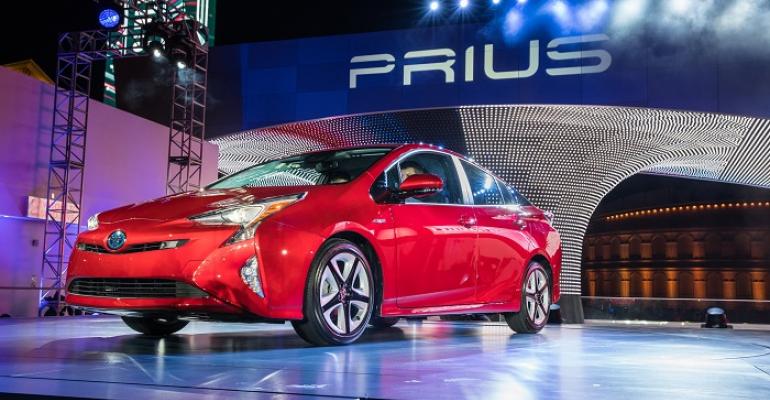As it continues to trickle out details on the next-generation Prius hybrid, Toyota confirms speculation the vehicle will offer a choice of nickel-metal hydride or lithium-ion batteries.
Li-ions are the battery of choice for most EVs and some hybrids by other manufacturers, but up to now in the standard Prius Toyota only has offered NiMh batteries. An Li-ions was exclusive to the Prius plug-in hybrid.
Li-ions have higher energy density but Toyota has said in the past it preferred to stick with the tried and true, lower-cost NiMh technology.
Toyota does not confirm reports the Li-ion will be available in the Prius’s new Eco grade, which has been rumored to be the highest-mileage grade of the car with a 60-mpg (3.9 L/100 km) rating.
The No.1 Japanese automaker details how it achieved a more than 40% increase in thermal efficiency of the car’s 1.8L VVT-i engine, crediting a large-volume exhaust-gas recirculation system and a redesigned air-intake port improving airflow inside the combustion chamber.
Friction created by various components also is reduced, including piston skirts, rotating parts and the oil pump.
The car’s electric motor sees a 20% reduction in mechanical losses due to friction, Toyota says, adding parallel gears replace the planetary gear arrangement in the reduction gear.
The new Prius also gets an active shutter grille and a more compact exhaust-heat recirculation system.
An engine-coolant-selector valve is said to improve cold-weather fuel efficiency.
The hybrid car, built on Toyota’s new Toyota Global New Architecture platform, has 60% more torsional rigidity than the outgoing Prius thanks to laser-screw welding, structural adhesives and “uniquely shaped frame structures,” the automaker says.
Like most redesigned vehicles, the new Prius sees a strong increase in high-tensile-strength steel content, to 19% vs. just 3% in the ’15 model.
Toyota reiterates an expected 10% increase in fuel economy, which would put the car’s combined number at 55 mpg (4.3 L/100 km).
Full details of the fourth-generation Prius are expected to be released in conjunction with the car’s Tokyo motor show debut later this month.





